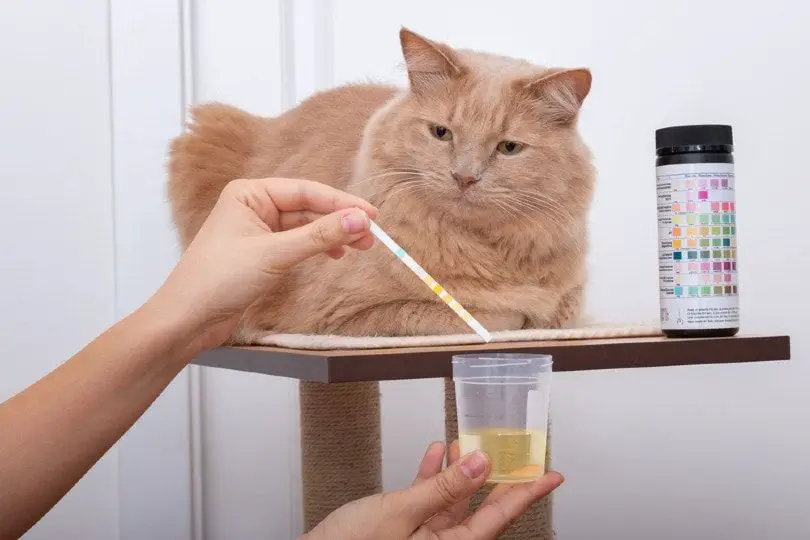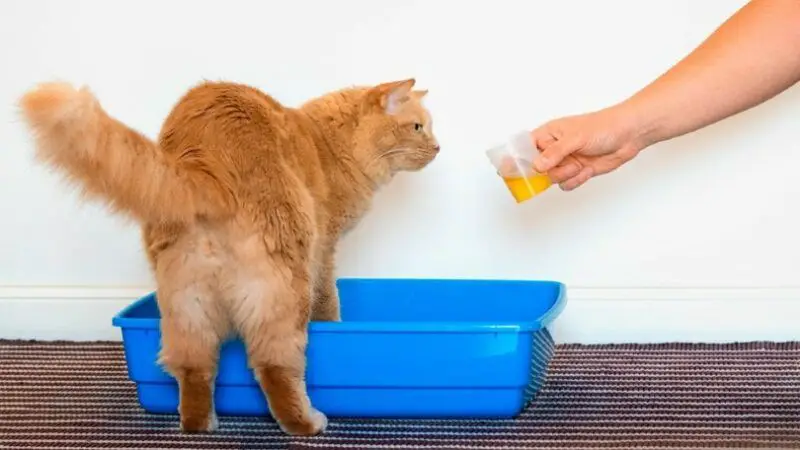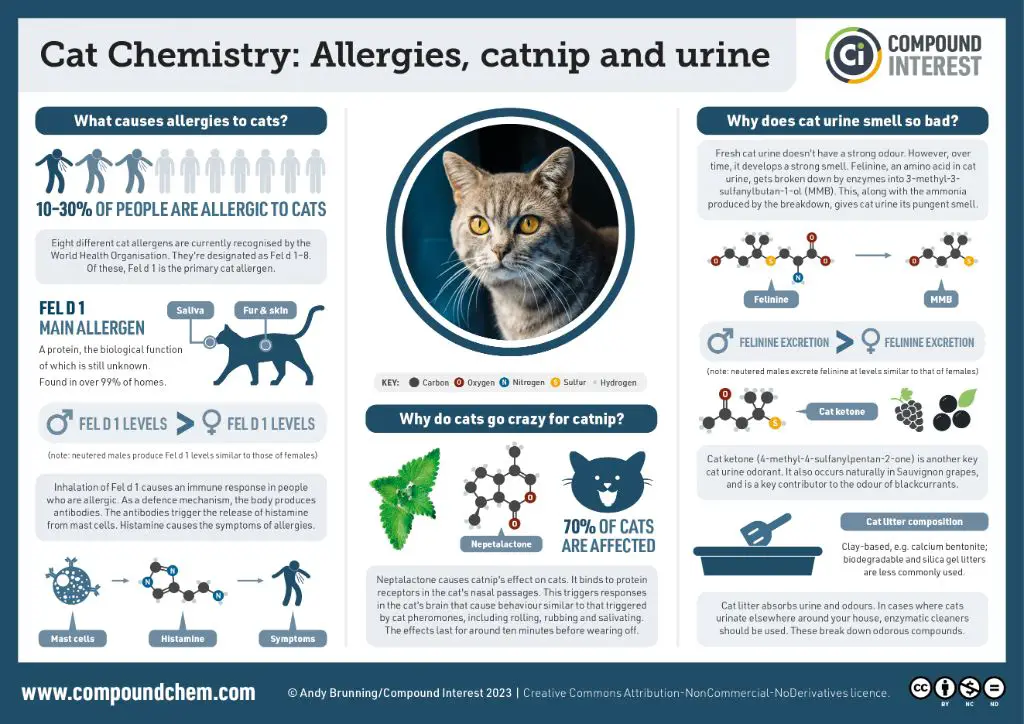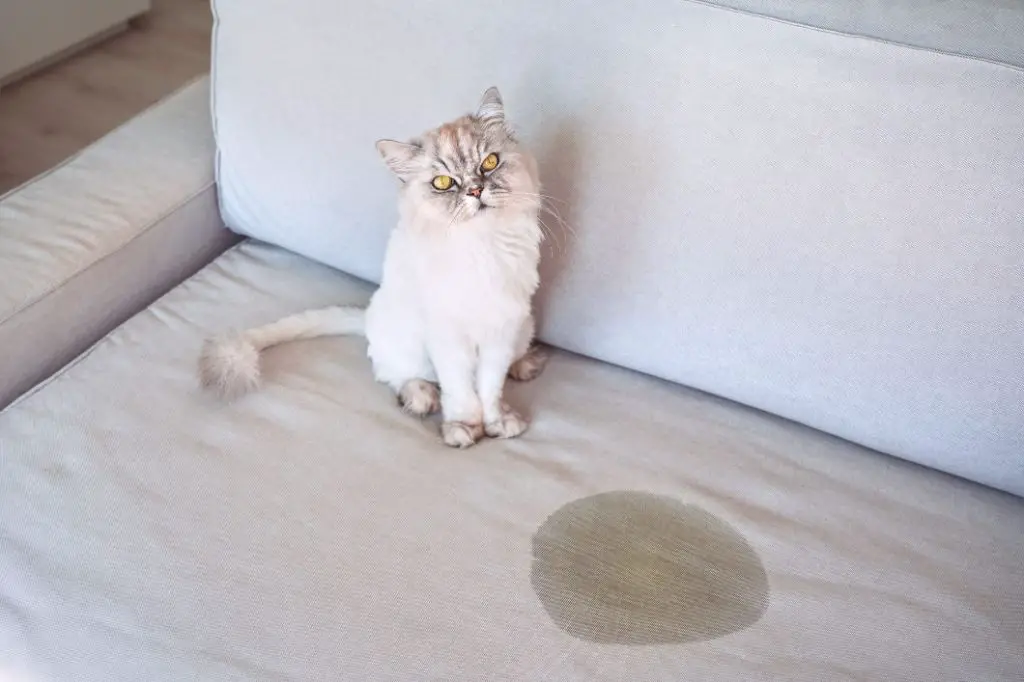It’s common for cat urine to have an ammonia smell. The ammonia odor comes from urea, which is excreted in cat urine. When urea breaks down, it produces ammonia, which has a pungent smell.
An ammonia smell in cat urine is often natural, but it can also indicate potential health issues. A strong ammonia odor or sudden change in smell can signal that something is off with your cat. It’s important to pay attention to changes in urine odor, as it may require veterinary attention.
What Causes the Ammonia Smell
The strong ammonia odor from cat urine is primarily caused by the chemical composition of cat urine, specifically the breakdown of urea. Urea is one of the main waste products excreted in urine and is composed of nitrogen and carbon.
When fresh urine is expelled, the urea has not yet broken down and there is only a mild odor. However, as the urine dries and bacteria start decomposing the urea, ammonia is released as a byproduct, producing the strong ammonia smell typically associated with cat urine [1].

This bacterial decomposition happens more readily when the urine is concentrated or alkaline. Male cats typically have more concentrated urine than females, which is why their urine often smells stronger. The alkaline nature of cat urine, with a pH around 8, also promotes the chemical breakdown of urea.
In summary, the ammonia odor comes from the natural chemical composition of cat urine and the bacterial decomposition process. Understanding this mechanism helps identify potential ways to reduce the smell.
Is the Smell Normal?
For most healthy cats the ammonia smell is normal. Cat urine contains urea, which breaks down into ammonia and causes the strong odor associated with cat pee. According to Catster, this is a natural byproduct and not usually a cause for concern.
However, there are some reasons the smell may be stronger than usual:
- Not cleaning the litter box frequently enough allows ammonia from urine to build up
- Dehydration leads to more concentrated, stronger-smelling urine
- Urinary tract infections or kidney disease affects the composition and odor of urine
- Improper litter or litter box location can let odors spread through the home

While a mild ammonia odor is normal, a very strong or persistent smell could indicate an underlying health issue. It’s important to monitor the litter box and your cat’s bathroom habits.
When to Be Concerned
While a mild ammonia odor in cat urine is normal, certain changes can indicate underlying health issues. According to Arm and Hammer, an excessively strong ammonia smell in cat pee can be a sign of highly concentrated urine due to kidney disease.
Increased urinary frequency, straining or crying when trying to pee, bloody or cloudy urine, and urinating outside the litter box can all indicate potential problems like urinary tract infections or bladder stones. These issues require veterinary attention to diagnose and treat.
Kidney disease and UTIs can cause ammonia compounds to build up in the body from the inability to properly filter waste products. This causes an abnormally strong scent. Observe your cat’s litter box habits and contact your vet if any concerning signs arise.
Underlying Health Issues
Sometimes an ammonia smell in a cat’s urine can indicate an underlying health issue. According to https://www.astrobrite.net/can-i-get-sick-from-smelling-cat-urine-your-worst-fears-confirmed/, common conditions that can cause a stronger ammonia odor in cat urine include:
- Urinary tract infections (UTIs)
- Kidney disease
- Diabetes

With UTIs, the infection causes an increase in bacteria in the urine, which gives off a potent ammonia smell. Kidney disease can cause buildup of urine metabolites like ammonia, again making the smell stronger.
Diabetes leads to excess glucose being expelled in the urine, which bacteria feed on and create ammonia as a byproduct. So in all these cases, the underlying illness enables more ammonia production in the cat’s urine.
If your cat’s urine suddenly smells much stronger of ammonia, have your vet run tests to check for issues like UTIs, kidney disease, diabetes, and other conditions. With treatment of the underlying problem, the ammonia smell may be reduced.
Litter Box Location and Cleaning
The location of your cat’s litter box can greatly impact how strong the ammonia odor is. Litter boxes placed in small enclosed spaces like closets tend to concentrate the smell. The best location is in a open, well-ventilated area, away from major traffic areas in the home. Placing the litter box near an air vent or window can help odors dissipate faster.
Frequent cleaning and scooping is also essential for reducing ammonia odors. The urine and feces should be scooped out of the litter box daily, removing all solids and clumps. Then, dump all the litter and wash the box with soap and hot water weekly. This will prevent build up of odor-causing bacteria. Replace the litter at least every 2-3 weeks.
According to this article, high ammonia levels are often a result of poor litter box hygiene and infrequent cleaning. Maintaining a clean litter box through scooping and changing litter regularly can significantly decrease the ammonia smell.
Diet and Hydration
A cat’s diet can significantly impact the smell of their urine. Foods high in protein and amino acids contain more nitrogen, which gets converted to ammonia. This causes urine to have a stronger, more pungent odor.
Cats fed a high-protein diet or foods with poor digestibility tend to produce urine with a stronger ammonia smell. Switching to a high-quality food with moderate protein levels can help reduce odor.
Staying hydrated is also important. Concentrated urine has a stronger ammonia odor. Cats with kidney disease produce very dilute urine, drastically reducing smell. Ensuring your cat drinks plenty of water can help decrease concentration and ammonia odor.
Offer wet food, add water to dry food, provide multiple water bowls, use cat fountains, and monitor water intake. Work with your vet if your cat isn’t drinking enough. Proper hydration leads to less concentrated, better smelling urine.
Additionally, some cat foods and supplements contain ingredients like Yucca schidigera that can help reduce odor. Talk to your vet before making major diet changes.
Home Remedies
There are several home remedies that can help reduce or eliminate the ammonia smell from cat urine:
Vinegar is commonly recommended as a cleaning solution for cat pee. A 1:1 mixture of white vinegar and water can be gently blotted onto the soiled area to help remove odors. The acetic acid in vinegar helps to neutralize alkaline compounds like ammonia that cause odors (1). Allow the vinegar solution to sit for 5-10 minutes before blotting it up.
Enzyme cleaners designed for pet messes can also be very effective at eliminating odors. Look for enzyme cleaners specifically formulated for cat urine, as they contain proteases that break down the proteins in cat pee that produce odors. Thoroughly soak the area with the enzyme cleaner and allow it to sit overnight before blotting and rinsing (2).

HEPA air purifiers with activated carbon filters can help remove ammonia and other odorous compounds from the air. Place air purifiers near litter boxes or frequently soiled areas to continuously filter and refresh the air (3).
Regular cleaning and grooming habits like scooping litter boxes daily, washing bedding weekly, and brushing your cat’s coat can also reduce odors at their source before they spread. Keep your cat’s living areas clean to prevent the buildup of odorous compounds.
Medical Treatment
There are some medications and dietary supplements that can help reduce the ammonia odor in cat urine:
Antibiotics: If a bacterial infection is causing the smell, your vet may prescribe antibiotics like Amoxicillin to treat the underlying infection (Why Does My Cat’s Pee Smell So Bad?).
Methionine supplements: Methionine is an amino acid that can acidify urine and reduce ammonia production. Vets may recommend methionine supplements to alter urine pH (What Can I Give My Cat for a Very Strong Urine Smell?).
Diet change: Changing to a wet food diet or prescription food for urinary health may help reduce odors. Canned foods have more moisture content, which dilutes urine and leads to less concentrated ammonia smells (Why Does Cat Urine Smell Like Ammonia?).
Vitamin supplements: B-vitamins and Vitamin C supplements can help support kidney health and normal urine pH to reduce odors.
When to See the Vet
There are certain signs that warrant a visit to the veterinarian. A strong ammonia smell in your cat’s urine could indicate an underlying health issue that requires medical attention. Some key signs to watch for include frequent urination, straining or crying out when urinating, blood in the urine, urinary blockages, and urinating outside the litter box.
It’s important to have your vet do a urinalysis to check for signs of infection, crystals, bladder stones, kidney disease, diabetes, or other conditions. Treatment will depend on the underlying cause. Your vet may prescribe antibiotics for infections or special food to manage crystals. For recurring UTIs or bladder stones, they may recommend surgery.
To help minimize issues, make sure your cat is drinking enough water daily and is on a high-quality diet. Clean the litter box frequently with gentle, cat-safe cleaners. Limit stress for your cat and provide plenty of environmental enrichment. Routine wellness checks with your vet can also help catch problems early.

